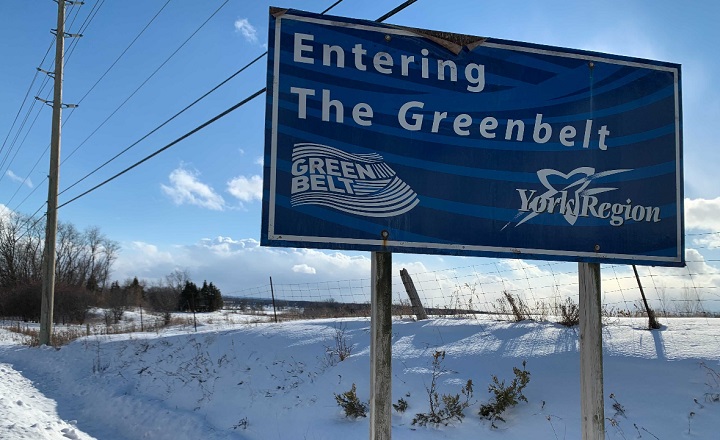Advocates in Simcoe County are speaking out about the province’s housing bill and plans to develop the land protected by the Ontario Greenbelt.

On Tuesday morning, representatives from various housing and environmental sectors joined a joint press conference at the headquarters of the Simcoe County Federation of Teachers in Barrie.
The coalition said in a statement that Simcoe County needs more affordable housing while ensuring the places that grow our food, clean our drinking water and make Simcoe County a beautiful place to live will stay healthy and robust into the future.
“Our biggest concern is that the recommendations to improve housing affordability that the taskforce had encouraged hasn’t been followed, and instead there are these poison pill policies that weaken municipal powers, that open up significant wetlands and forests to a pay-to-play program,” said Margaret Prophet, executive director of Simcoe County Greenbelt Coalition.
“We’re in a climate emergency, so the style of development that Ontario seems to prefer is the most costly not only for taxpayers but also for the climate.”
Bill 23 — named the More Homes Built Faster Act — was tabled on Oct. 25, the day after municipal elections were held across Ontario. It has wide-ranging implications for cities.
The Bill, which has passed second reading, reduces the money land developers are required to give to cities when they build housing in a push to minimize the time and cost of building new housing.
The current system of costs for developers, cities argue, ensures that homebuilders pay for the services for new residents.

“Bill 23 is an ominous bill. So it takes away so much of the existing rules, the existing regimes in planning and environmental protection that are required,” said Bernard Pope, chair of the Ontario Farmland Trust.
Pope warned that breaking up the land and destroying water systems in the Greenbelt would lead to flooding. He questioned who benefits from the changes.

Get breaking National news
“Rules were made, so we don’t build on flood plains, for example, and we have conservation organizations with the authority of protecting the wetlands, and we have conservation groups that are specific in their areas.”
The Ford government has promised to build 1.5 million homes in 10 years.
- Michael Kovrig reflects on ‘brutally hard’ Chinese detention: ‘You’re totally alone’
- After controversial directive, Quebec now says anglophones have right to English health services
- TD Bank moves to seize home of Russian-Canadian jailed for smuggling tech to Kremlin
- Conservatives set to table non-confidence motion Tuesday. What to expect
“Our government is following through on our commitment to Ontarians by cutting delays and red tape to get more homes built faster,” said Municipal Affairs and Housing Minister Steven Clark in a media release.
“We need to ensure that we have a plan that not only builds the volume of homed we need, but we also need the right types of homes,” Clark said in the Ontario legislature.
But critics are also worried about where the province plans to build these new homes, namely the proposed plan to redevelop 7,400 acres of the Ontario Green Belt.
The area, which stretches from the Niagara region through Hamilton, around Toronto, up the Bruce Peninsula, and Lake Simcoe’s southeast side, was created to shelter environmentally sensitive areas from development.
Earlier this month, the government announced it would launch a 30-day consultation on removing a significant portion, adding 9,400 acres elsewhere.

Premier Doug Ford said earlier this month the development of the protected land is needed to keep up with the increase of newcomers coming to Canada.
The province said the proposed development would create 50,000 new homes.
But Prophet said the claim that Greenbelt land is needed is a “bald-faced lie.”
“The Greenbelt is the ecological backbone of Ontario.”
“(The province’s) own housing affordability task force clearly said the Greenbelt did not need to be opened up for housing,” she said.
Robert Bowles, founder of the Ontario Master Naturalist Program at Lakehead University and member of the Orillia Wetland Watchers, worries about the ecological impacts, with the Greenbelt serving as an essential tool in filtering the air and water systems.
Bowles said the government should focus on science and listening to conservation authorities on the area’s importance instead of developers.
“My estimate is within the county area, we’ve lost 92 per cent of all our wetlands. In Southern Ontario, in the GTA, those wetlands are protecting us and keeping our water clean and clear, protecting species at risk. We have to put species at risk protection back in,” he said.
— With files from Global News’ Isaac Callan and Shallima Maharaj








Comments